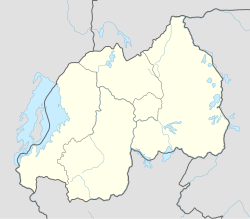
Rwanda, officially the Republic of Rwanda, is a landlocked country in the Great Rift Valley of East Africa, where the African Great Lakes region and Southeast Africa converge. Located a few degrees south of the Equator, Rwanda is bordered by Uganda, Tanzania, Burundi, and the Democratic Republic of the Congo. It is highly elevated, giving it the sobriquet "land of a thousand hills", with its geography dominated by mountains in the west and savanna to the southeast, with numerous lakes throughout the country. The climate is temperate to subtropical, with two rainy seasons and two dry seasons each year. It is the most densely populated mainland African country; among countries larger than 10,000 km2, it is the fifth-most densely populated country in the world. Its capital and largest city is Kigali.

Paul Kagame is a Rwandan politician and former military officer who has been the President of Rwanda since 2000. He was previously a commander of the Rwandan Patriotic Front (RPF), a rebel armed force which invaded Rwanda in 1990. The RPF was one of the main belligerents of the Rwandan Civil War and was the armed force which ended the Rwandan genocide. He was considered Rwanda's de facto leader when he was Vice President and Minister of Defence under President Pasteur Bizimungu from 1994 to 2000 after which the vice-presidential post was abolished.

The national flag of Rwanda is a horizontal tricolour of light blue, yellow, and green, in a 2:1:1 ratio, charged with a golden sun in the upper fly-side corner. It was adopted on 31 December 2001 and replaced the flag adopted shortly before independence. The design of the flag is defined in the Rwandan constitution and regulations regarding the use and manufacture of the flag are outlined in the country's national flag law.

The Rwandan Patriotic Front is the ruling political party in Rwanda.

The Interahamwe is a Hutu paramilitary organization active in the Democratic Republic of the Congo and Uganda. The Interahamwe was formed around 1990 as the youth wing of the National Republican Movement for Democracy and Development, the then-ruling party of Rwanda, and enjoyed the backing of the Hutu Power government. The Interahamwe, led by Robert Kajuga, were the main perpetrators of the Rwandan genocide, during which an estimated 500,000 to 1,000,000 Tutsi, Twa, and moderate Hutus were killed from April to July 1994, and the term "Interahamwe" was widened to mean any civilian militias or bands killing Tutsi.

The Rwandan genocide, also known as the genocide against the Tutsi, occurred from 7 April to 19 July 1994 during the Rwandan Civil War. Over a span of around 100 days, members of the Tutsi ethnic group, as well as some moderate Hutu and Twa, were systematically killed by Hutu militias. While the Rwandan Constitution states that over 1 million people were killed, most scholarly estimates suggest between 500,000 and 662,000 Tutsi died. The genocide was marked by extreme violence, with victims often murdered by neighbors, and widespread sexual violence, with between 250,000 and 500,000 women raped.

"Rwanda Nziza" has been the national anthem of Rwanda since January 1, 2002. It replaced "Rwanda Rwacu", which was the original national anthem until the 1994 genocide against the Tutsis.

The Rwandan Defence Force is the military of the Rwanda. Prior to 1994, Rwanda's military was officially known as the Rwandan Armed Forces (FAR), but following the Rwandan Civil War and the Rwandan genocide, the Rwandan Patriotic Front (RPF) renamed it the Rwandan Patriotic Army (RPA), which was the military wing of the RPF. In late 1994, the military was rebuilt and reorganized as the Rwandan Defence Force (RDF).
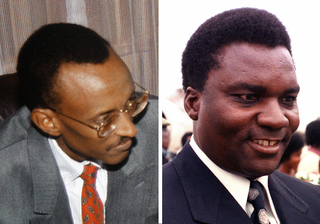
The Rwandan Civil War was a large-scale civil war in Rwanda which was fought between the Rwandan Armed Forces, representing the country's government, and the rebel Rwandan Patriotic Front (RPF) from 1 October 1990 to 18 July 1994. The war arose from the long-running dispute between the Hutu and Tutsi groups within the Rwandan population. A 1959–1962 revolution had replaced the Tutsi monarchy with a Hutu-led republic, forcing more than 336,000 Tutsi to seek refuge in neighbouring countries. A group of these refugees in Uganda founded the RPF which, under the leadership of Fred Rwigyema and Paul Kagame, became a battle-ready army by the late 1980s.
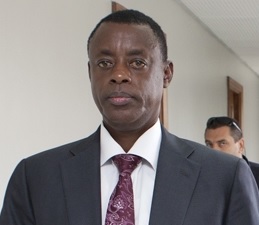
James Kabarebe is a Rwandan retired military officer who serves as Minister of State for Regional Integration in the Ministry of Foreign Affairs.

Fred Gisa Rwigema was a Rwandan military officer and revolutionary. He was the founder of the Rwandan Patriotic Front (RPF), a political and rebel group formed by Rwandan Tutsi exile descendants of those forced to leave the country after the 1959 Hutu Revolution.
The Union of Congolese Patriots is a political and militia group in Ituri, northeastern Democratic Republic of the Congo, formed towards the end of the Second Congo War. It was founded by Thomas Lubanga in 2001 and was one of six such groups that sprung up in the mineral-rich Ituri region on the border with Uganda in the Ituri conflict. The UPC supported and was primarily composed of the Hema ethnic group.
Bosco Ntaganda is a Congolese former rebel leader and convicted war criminal. He was the former military chief of staff of the National Congress for the Defense of the People (CNDP), a rebel that group operated in the North Kivu province of the Democratic Republic of the Congo (DRC) during the first phases of the Kivu conflict. He is also a former member of the Rwandan Patriotic Frint (RPF) and a veteran of the Rwandan Civil War, as well as an alleged former Deputy Chief of the General Staff of the Patriotic Forces for the Liberation of Congo (FPLC), the military wing of the Union of Congolese Patriots.

The International Criminal Court investigation in the Democratic Republic of the Congo or the situation in the Democratic Republic of the Congo is an ongoing investigation by the International Criminal Court (ICC) into crimes committed in the Democratic Republic of the Congo (DRC) during the Second Congo War and its aftermath, including the Ituri and Kivu conflicts. The war started in 1998 and despite a peace agreement between combatants in 2003, conflict continued in the eastern parts of the country for several years. In April 2004 the government of the DRC formally referred the situation in the Congo to the International Criminal Court, and in June 2004, prosecutor Luis Moreno Ocampo, formally opened an investigation. To date, arrest warrants have been issued for:

Parliamentary elections were held in Rwanda between 16 and 18 September 2013. The result was a victory for the Rwandan Patriotic Front, which maintained its absolute majority in the Chamber of Deputies, winning 41 of the 80 seats.
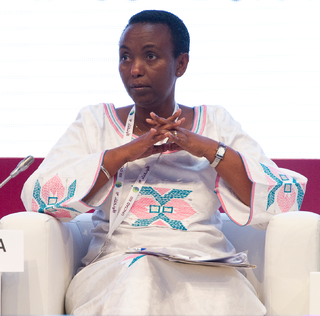
Aloisea Inyumba was a Rwandan politician, who was the country's Minister for Gender and Family Promotion and as executive secretary of the National Unity and Reconciliation Commission.
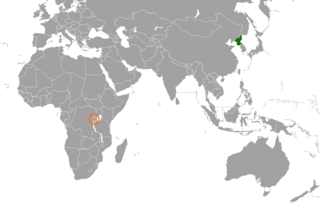
North Korea–Rwanda relations refers to the current and historical relationship between North Korea and Rwanda. Neither country maintains an embassy in their respective capitals.

Liberation Day is a public holiday in Rwanda which is celebrated on 4 July. It commemorates the defeat and downfall of the Hutu-led regime in Rwanda by the Rwandan Patriotic Front (RPF) in the Rwandan Civil War, thus ending the Rwandan genocide. On 4 July 1994, the RPF secured the capital of Kigali while the end of the war only became official on 18 July with the liberation of northwestern Rwanda. Liberation Day takes place a week after Independence Day, although it is more of a celebration rather than the national mourning period for the Rwandan Revolution on Independence Day.
